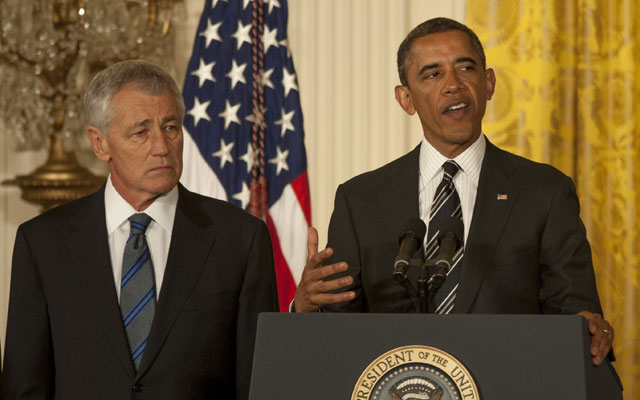Hagel in the Senate Hot Seat
Helle Dale /
The Senate Armed Services Committee is holding hearings today on the nomination of former Senator Chuck Hagel (R–NE) to head the Department of Defense (DOD).
The issues before the committee are both numerous and critically serious, such as the consequences for the defense budget of sequestration, nuclear zero, missile defense and overseas military commitments. A less visible but nonetheless important issue is the DOD’s role in strategic communication and public affairs—part of the U.S. government’s complex of global communication capabilities.
While public affairs officers under individual commanders have had a long-standing role at the Pentagon, the idea of special offices assigned to “strategic communication” is relatively new. It has been around since the war in the Balkans in the 1990s and received increased attention during the U.S. military engagements in Iraq and Afghanistan under Secretary of Defense Donald Rumsfeld. It is essentially the effort to bureaucratically and operationally coordinate military actions and messaging. All of which can be easier said than done.
The 1.4 million men and women of the U.S. armed forces are the United States’ most visible presence around the world. They are often outstanding ambassadors. However, the military has had a deeply conflicted view of bringing a U.S. message to local populations to achieve specific outcomes. Under the Obama Administration, especially, it has sometimes seemed easier to get permission to shoot people than to inform or persuade them to a U.S. point of view.
As reported by USA Today, the DOD in December banished the phrase “strategic communication.” In a memo obtained by the newspaper, Assistant Secretary of Defense for Public Affairs George Little wrote that over the past six years, strategic communication “actually added a layer of staffing and planning that blurred roles and functions of traditional staff elements and resulted in confusion and inefficiencies.”
In the Army, according to the paper, personnel assigned to strategic communication slots increased from seven in 2006 to 38 in 2012, and the Army spent $5 million for strategic communication contractors. Detractors of these efforts have included none less than Admiral Michael Mullen, former chairman of the Joint Chiefs of Staff, who has argued that strategic communication is a waste of time and money.
All the criticism of influence or information operations has resulted in the elimination of controversial terms like “psychological operations” and “strategic communication.” Yet the Pentagon continues to possess considerable capability in this field, much of it run out of Special Operations Command in Tampa, Florida.
Hagel has a long history of commitment to engaging foreign audiences, speaking at The Heritage Foundation on U.S. public diplomacy in 2003. It would be very interesting to hear Hagel’s view on the role of the Pentagon in synchronizing U.S. global actions and messages.

